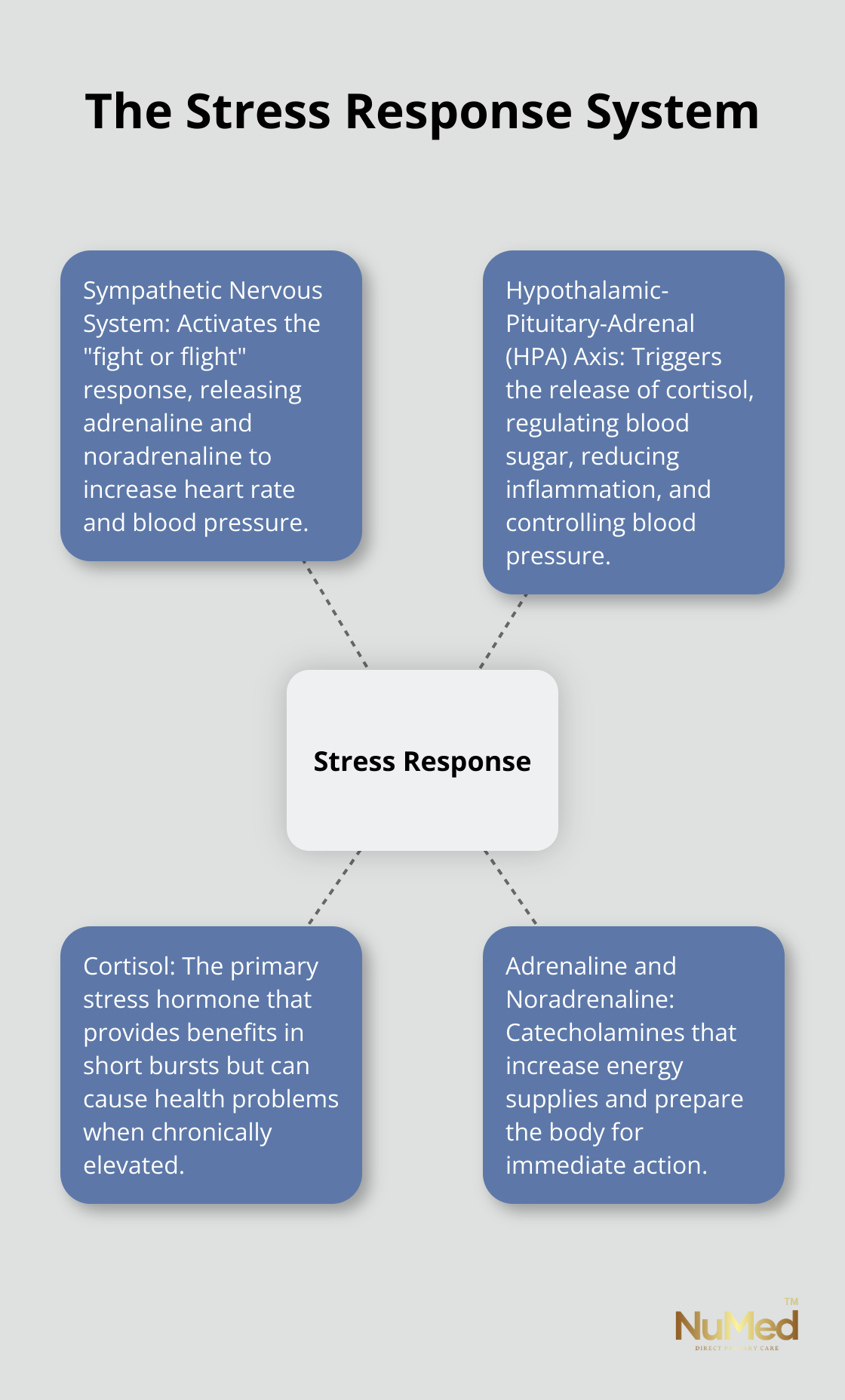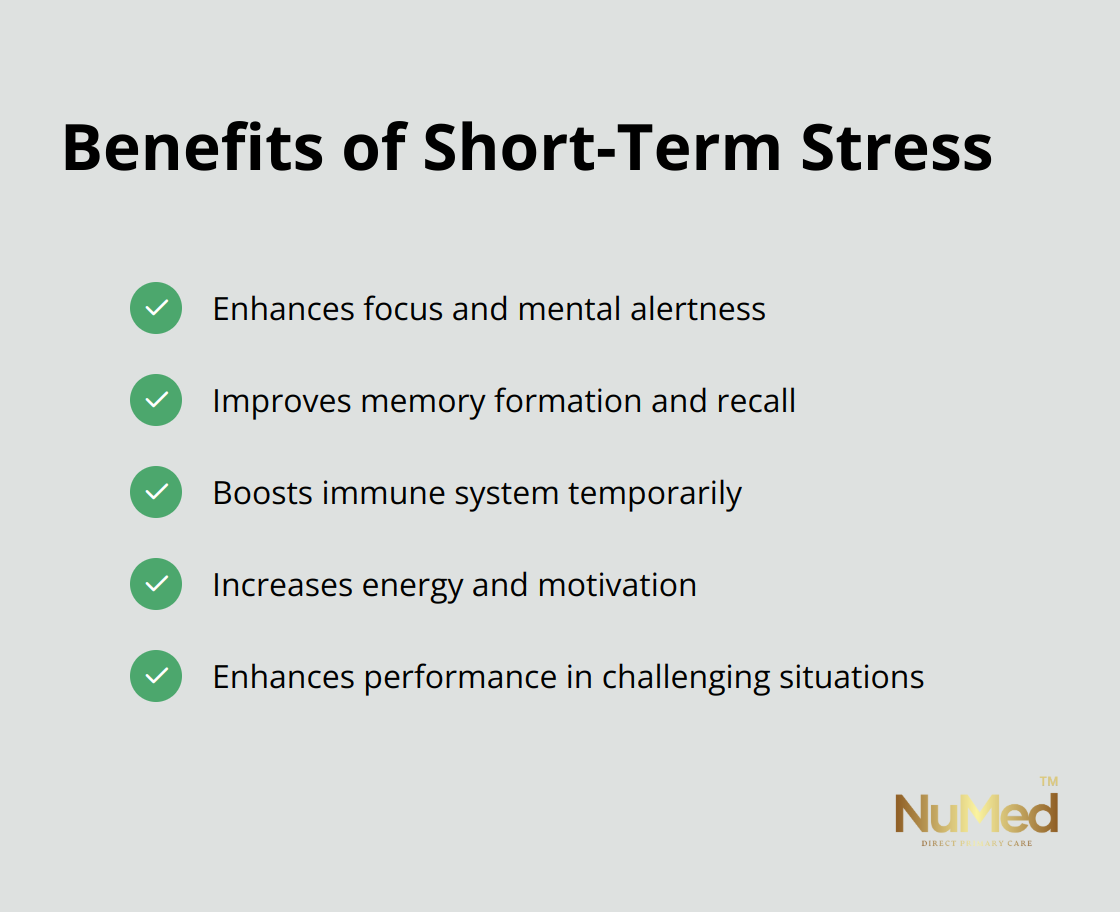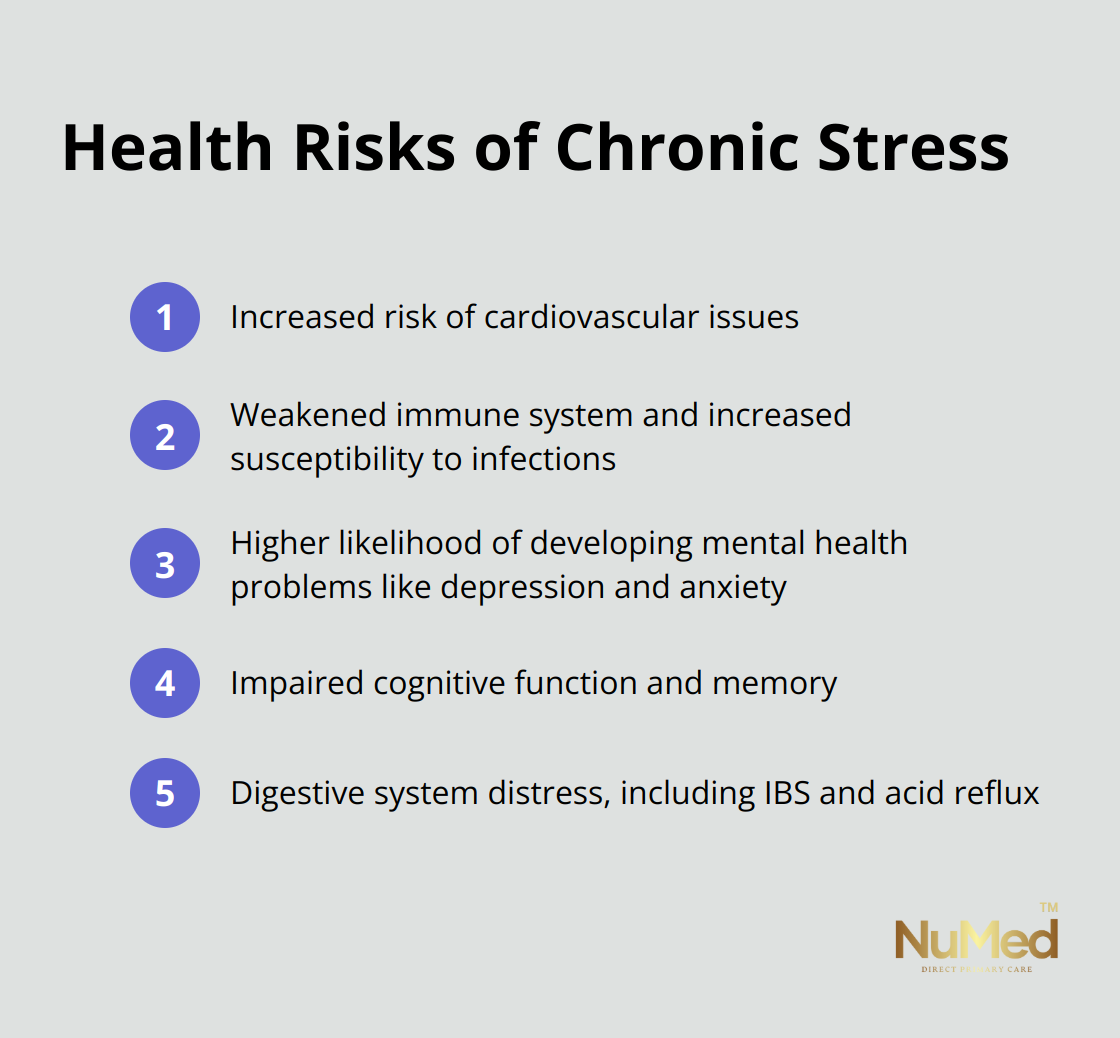At NuMed DPC, we understand that stress is a complex phenomenon with both protective and damaging effects on our health.
Stress mediators, such as cortisol and adrenaline, play a crucial role in our body’s response to challenges and threats.
In this blog post, we’ll explore how these stress mediators can be both beneficial and harmful, depending on the duration and intensity of the stress response.
What Are Stress Mediators?
The Body’s Response to Challenges
Stress represents your body’s reaction to challenges or threats. At NuMed DPC, we often encounter patients who struggle with stress-related health issues. Understanding stress mediators is essential for effective well-being management.
The Stress Response System
When you face a stressful situation, your body activates a complex network of hormones and neurotransmitters. These stress mediators prepare you to handle perceived threats. Two main systems play a role in this process:

- The sympathetic nervous system
- The hypothalamic-pituitary-adrenal (HPA) axis
Key Players in the Stress Response
Cortisol, often labeled the “stress hormone,” acts as a primary stress mediator. It regulates blood sugar levels, reduces inflammation, and controls blood pressure. In short bursts, cortisol provides benefits. However, chronically high cortisol levels can result in health problems.
Adrenaline and noradrenaline (catecholamines released during stress) increase heart rate, blood pressure, and energy supplies. While these responses help in emergencies, prolonged activation can strain your cardiovascular system.
Acute vs. Chronic Stress
Acute stress lasts for a short time and can actually benefit you. It sharpens your focus and helps you perform under pressure. For example, the stress you experience before a job interview might motivate you to prepare more thoroughly.
Chronic stress, in contrast, persists for extended periods and can harm your health.
Managing Your Stress Response
Understanding how your body responds to stress marks the first step in taking control of your health. Distinguishing between acute and chronic stress allows you to develop effective management strategies. Try to identify your stress triggers and implement relaxation techniques (such as deep breathing or meditation) to mitigate the harmful effects of long-term stress mediator activation.
As we explore the protective effects of stress mediators in the next section, you’ll gain insight into how these biological responses can actually safeguard your body in certain situations.
How Stress Can Benefit Your Health
Sharpening Your Mental Edge
Stress isn’t always the villain it’s portrayed to be. Short-term stress can actually boost your body’s performance in several ways. When you’re under acute stress, your brain kicks into high gear. Cortisol and adrenaline flood your system, improving your ability to focus and process information quickly. This heightened state of alertness can be particularly beneficial in situations that require quick thinking or problem-solving.

A study published in the journal Psychoneuroendocrinology found that stress enhanced recognition memory performance when the stressor occurred in a different spatial and psychological context from the encoding event. The researchers attributed this to the stress hormones’ ability to enhance the formation and recall of memories.
Boosting Your Immune Defenses
Surprisingly, short bursts of stress can give your immune system a temporary boost. A study from the Stanford University School of Medicine revealed that moderate stress levels increase the production of interleukins (proteins crucial for fighting infections and healing wounds).
To harness this benefit, you might consider engaging in brief, challenging activities before important events. A quick workout or solving a complex puzzle could trigger this beneficial stress response, potentially giving your immune system a temporary edge.
Fueling Performance and Motivation
The surge of adrenaline and cortisol during stress events can provide a burst of energy and motivation. This natural “high” can help you push through challenging tasks or meet tight deadlines.
Many people use this to their advantage in various scenarios. For instance, some report improved performance in public speaking or athletic events when they learn to channel their pre-event jitters productively.
Striking the Right Balance
While these protective effects of stress can benefit you in the short term, chronic stress can lead to health issues. It’s important to find a balance and manage your stress levels effectively. Try to incorporate stress management techniques into your daily routine and consider regular check-ups to ensure your stress levels remain in a healthy range.
Understanding and harnessing the protective effects of stress mediators can potentially improve your cognitive function, boost your immune response, and enhance your performance in various aspects of life. The key lies in moderation and proper management of your stress levels.
As we explore the damaging effects of chronic stress in the next section, you’ll gain a comprehensive understanding of how prolonged stress can impact your health and well-being.
The Hidden Toll of Chronic Stress
Chronic stress takes a severe toll on your body and mind, often in subtle ways. Let’s explore the serious health risks associated with prolonged stress exposure and what you can do about it.

The Heart of the Matter
Sustained smoking significantly speeds up the progression of atherosclerosis, increasing the risk of severe cardiovascular issues. This highlights the importance of addressing both stress and smoking for heart health.
To protect your heart, incorporate stress-reduction techniques into your daily routine. Small changes like a 10-minute daily meditation practice or a brisk walk can make a significant difference. If you worry about your heart health, schedule a comprehensive check-up to assess your risk factors.
When Your Defenses Fall
Chronic stress can lead to immunosuppression, making the body more susceptible to infections and less capable of mounting effective immune responses.
Boost your immune system by prioritizing sleep and maintaining a balanced diet rich in vitamins C and D. Regular exercise also plays a vital role in supporting immune function. If you find yourself frequently ill, it might be time to evaluate your stress levels and consider professional support.
The Mental Health Connection
The link between chronic stress and mental health issues is undeniable. A longitudinal study published in the Journal of Affective Disorders found that individuals experiencing high levels of work-related stress were twice as likely to develop depression within two years.
Don’t ignore the warning signs of stress-induced mental health issues. If you experience persistent feelings of anxiety or depression, seek professional help. Many effective treatments combine stress management techniques with targeted therapies to address these concerns.
Cognitive Consequences
Chronic stress can impair cognitive function and memory. Studies have shown that prolonged exposure to stress hormones can lead to changes in brain structure and function, particularly in areas related to memory and decision-making (such as the hippocampus and prefrontal cortex).
To protect your cognitive health, try stress-reduction techniques like mindfulness meditation or yoga. These practices can help reduce stress levels and improve cognitive function over time.
Digestive Distress
Stress doesn’t just affect your mind; it can also wreak havoc on your digestive system. Chronic cellular stress can exacerbate conditions like irritable bowel syndrome (IBS), acid reflux, and ulcers. It can also alter your gut microbiome, potentially leading to a range of health issues.
To support your digestive health during stressful times, focus on a balanced diet rich in fiber and probiotics. Consider incorporating relaxation techniques before meals to promote better digestion.
Final Thoughts
Stress mediators have both protective and damaging effects on our health. Acute stress sharpens focus and boosts immunity, while chronic stress harms physical and mental well-being. The challenge lies in managing stress levels effectively through regular exercise, mindfulness practices, and a balanced diet.
Professional help becomes necessary when self-management proves insufficient. We at NuMed Direct Primary Care offer a holistic approach to healthcare that addresses the root causes of stress-related health problems. Our personalized care model focuses on prevention and tailored treatments to help achieve optimal health outcomes.
Stress shouldn’t dominate your life. Take proactive steps to safeguard your health by understanding the protective and damaging effects of stress mediators. Your health journey is unique, and with the right support and strategies, you can harness the benefits of stress while minimizing its harmful impacts.
















